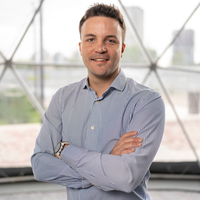Live bacterial formulations represent a promising new class of therapies for regulating imbalances in the human microbiome. However, China faces significant challenges in this field, including dependence on imported core bacterial strains, the monopolization of gene module technologies by Europe and the United States, and delays in clinical translation.
To address these issues, Diwei Zheng proposed novel concepts and methodologies for biomaterial-enhanced bacterial therapies aimed at intratumoral microbiota remodeling and metabolic cascade regulation. His work provides new therapeutic strategies for major diseases such as gastrointestinal cancers and renal failure.
By integrating multidisciplinary approaches from materials science, chemistry, and physics, he developed a bacterial modification toolbox capable of precise and efficient manipulation of bacteria at multiple scales, from substructures and individual bacterial cells to entire microbial communities. He systematically elucidated the interaction mechanisms between biomaterials and bacteria, introduced the concept of precise material-based regulation of complex bacterial ecosystems, and established spatiotemporal coupling technologies to control bacterial distribution within the body. Targeting malignant tumors and metabolic disorders, he investigated the interplay between disease states and microbiota, proposing clinically driven formulation strategies such as biomimetic retention and long-lasting adhesion. These efforts have led to the creation of a series of safe, effective, and multifunctional bacterial biomaterials, with early successes demonstrated in the treatment of major diseases.
This technology, by replacing traditional dialysis and organ transplantation with oral microbial communities, not only significantly reduces treatment costs but also completely avoids fatal complications such as peritonitis caused by dialysis. Currently, this technology has achieved a toxin clearance rate of over 80% in pig models, demonstrating significant clinical translation potential.
In addition, based on plasmolysis modification technology, Zheng successfully integrated functional prebiotics and probiotics with sodium chloride assistance, giving probiotics stronger adhesion, colonization, and metabolic enhancement capabilities. This is expected to lay a new generation of paradigms in in engineering bacterial constructs.




